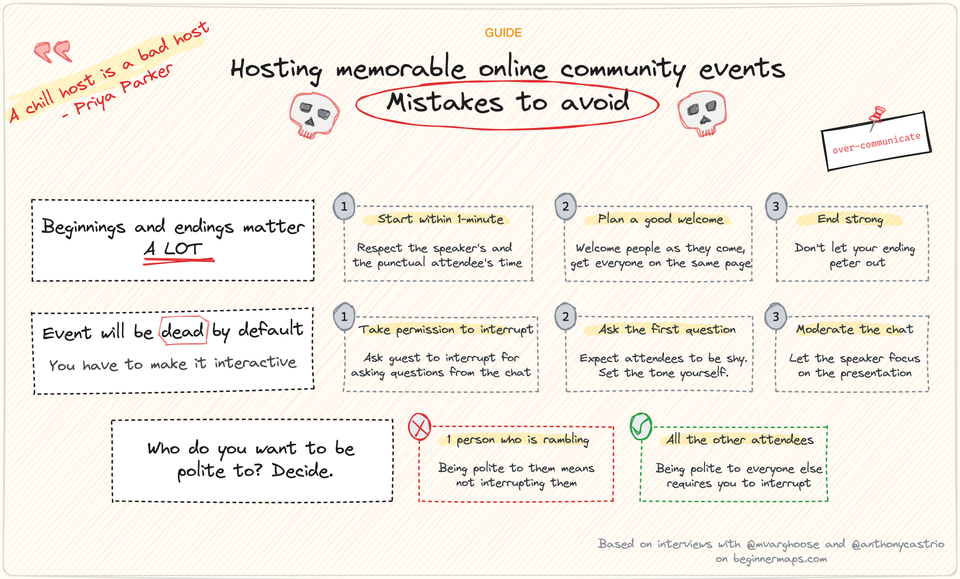Hosting memorable online community events: Mistakes to avoid
Two expert community builders share their hard-earned lessons on how to host memorable online events and what mistakes to avoid

When I interviewed Michelle, community manager at Small Bets and Anthony, founder of Indie Worldwide (2 separate interviews), there was a point when I said the same thing to both of them:
“I’m so embarrassed to admit that I have made this exact mistake.”
I interviewed them because I wanted to learn how to run good live events in an online community. So they told me things that you should never do. As they were speaking, I kept sinking in my seat.
I have made all of the dumb mistakes that they made painfully obvious on the call. Even though I was a community manager by profession for 4 years!
So, I’ve decided to compile their advice in this article. Hopefully this results in both you and I never repeating these mistakes in our online communities.
About Small Bets and Indie Worldwide
These are 2 private communities for entrepreneurs:
- Small Bets is a crazy one. It has 5000+ members, a really busy Discord and 5-10 live classes with experts each month. All of it for a one-time fee of $200 - $300 (depending on PPP).
- Indie Worldwide is the cozy one. Search for “best community for entrepreneurs” and it’ll come up on some list on the front page. It provides both an annual and a lifetime membership option.
Beginnings and endings matter a lot
Both Anthony and Michelle focused on the importance of good beginnings and endings - something that I had ignored in favour of focusing on the main meaty sections.
But now I realise that if you are having a guest speaker, a major part of your job as the community manager is to take care of the beginning and the ending.
Here are 3 actionable tips they shared:
1. Start within 1 minute of start time
You’ll see that events organised by most good communities like Small Bets don’t have a lag time. The feature presentation start within a minute of the start time. This may feel small but it’s important for 3 reasons:
- It teaches people that if you come late, you're going to miss something.
- It shows respect for the speaker’s time. They have probably put work into their presentation and have information they want to share. So you don't want people just like sitting around resulting in them having to cut off early.
- It shows respect for the time of all attendees who were punctual.
2. Plan a good welcome
“A link popped up and so I joined. There were maybe 10 people there, all with cameras off. And I was like, what is going on? Nobody was saying anything. I laughed because it felt so awkward.”
– Michelle Varghese reflecting on a bad community experience
As a good host, you’ll need to have a good plan. This means:
- If the event has not already started, say hi to people to let them know what's going on.
- Tell them that you're waiting a minute for other people to join. Over communicate.
- Have a clear introduction - “Here's why we're here. Here's who I think you are, you know, and then you go from there. So that everybody is on the same page, and you've kind of set the tone for the next hour, however long it is”
3. End strong
“You want people to have more to say, and not have had time to say it all. You don’t want your ending to peter out like, “I guess nobody else has anything else to say. So.. bye?"
– Anthony Castrio
You should close on a strong note that makes attendees feel the closure. It’s better to end when people still have something to say. Makes them excited about the next event and engaging asynchronously.
Something like -
Here's a next step you can take. Our next event is on this date. And then, I want you guys to remember something important that you all learned today.
Check-in with the guest a couple days before the event
While we’re on the subject of planning a strong beginning and an end, you should also be sure to check-in with the guest a couple days before the event.
“Hey are you good to go?”
This is important even if the guest is a good public speaker.
- They may want their slides reviewed. (Side note: tell your guests to prepare some slides. They are especially helpful if you have a global audience some of who may not have English as their first language. Plus, everyone likes to have something to look at. But make sure they don't just read from the slides.)
- They may have questions about the culture of your group like will the attendees have their cameras on or off, can they expect Q&A from audience, etc
You have to make it interactive
Every community experience is dead by default. You have to make it interactive.
So if you want your event to be buzzing with questions from the audience, you need to be proactive in sparking the conversations.
Here are a few steps you can take:
- Ask the guest for permission to interrupt for asking questions in the chat. Most good guests welcome questions from the audience. This is also the time when you let your attendees know that they’re encouraged to ask questions in the chat.
- Ask the first question. This is something that Daniel Vassallo, founder of Small Bets, does for their online classes. He’ll often be the person who interrupts and is curious about what the speaker is saying. This encourages other people in the community to do the same because people are shy.
- Moderate the chat. You don’t want your speaker to keep an eye on the questions coming in the chat. That’s distracting. Let them focus on their material. Instead, you be the person in charge of moderating the chat and interrupt them every so often to ask questions from the chat.
Remember - who you are being polite to
Imagine this, you ask the audience to share some type of an instance from their life. One person starts speaking and then goes on to speak about their business. Soon it has already been 2 minutes since they started speaking and you know they are nowhere near the end. What do you do?
As a host, you often come upon tricky situations like this.
In such situations, it’s helpful to ask yourself - who do you want to be polite to? You have 2 options:
- You can be polite to the person who's talking right now and not cut them off
- You can be polite to everybody else in attendance who is using their time to be there
You’ll realise that the right choice is to maximise your politeness by respecting everybody else in attendance. This means cutting off the one person who's talking.
And the person who’s talking is likely not ill-intentioned. Most people are not professional speakers and a lot of us ramble naturally. So the right response in those situations is to interrupt gently but assertively:
Wait for them to take a breath and say, “Hey, I love this question. We'll make sure we have some time at the end to get to it. But now, I'm going to have to keep moving forward just because I want to get through the last portion of this presentation.”
Because if I have an extra two minutes, I don't mind if someone goes on for a second, sharing their thoughts.
A chill host is a bad host
Finally I want to leave you with a quote from The Art of Gathering by Priya Parker
“A chill host is a bad host.”
– Priya Parker, The Art of Gathering
You may think you want to be a cool host. You don't want to be too formal, you don't want to tell people what to do and you don’t want structure.
If that’s true, know that you're not doing anybody a service.
Your community members need structure. They need to know how do people interact or Is it weird if I ask a question in the chat or what’s the culture of this meeting. By being a cool host, you’re rejecting your duty as a host.
It’s your duty to set a structure and communicate that to attendees up front. Because you’re the only person in the room who can do that. What’s worse - sometimes you’ll see that the loudest or most aggressive person will like take over the culture if you don’t accept that duty.
So, don’t be a chill host. Set structures. Over-communicate.
You’ll be surprised at how many people end up participating because of this.

